Unit 4 I used to be afraid of the dark.课时讲练课件(5课时,共63张PPT)
文档属性
| 名称 | Unit 4 I used to be afraid of the dark.课时讲练课件(5课时,共63张PPT) | 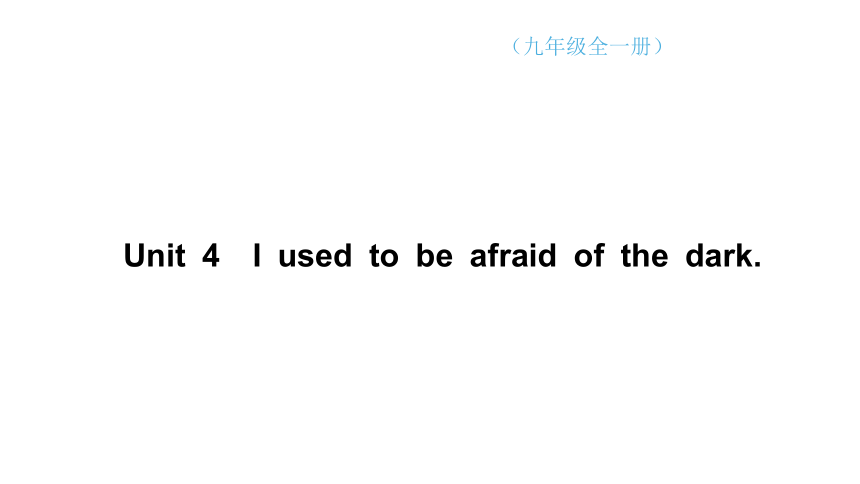 | |
| 格式 | pptx | ||
| 文件大小 | 474.2KB | ||
| 资源类型 | 教案 | ||
| 版本资源 | 人教新目标(Go for it)版 | ||
| 科目 | 英语 | ||
| 更新时间 | 2024-05-20 15:04:12 | ||
图片预览

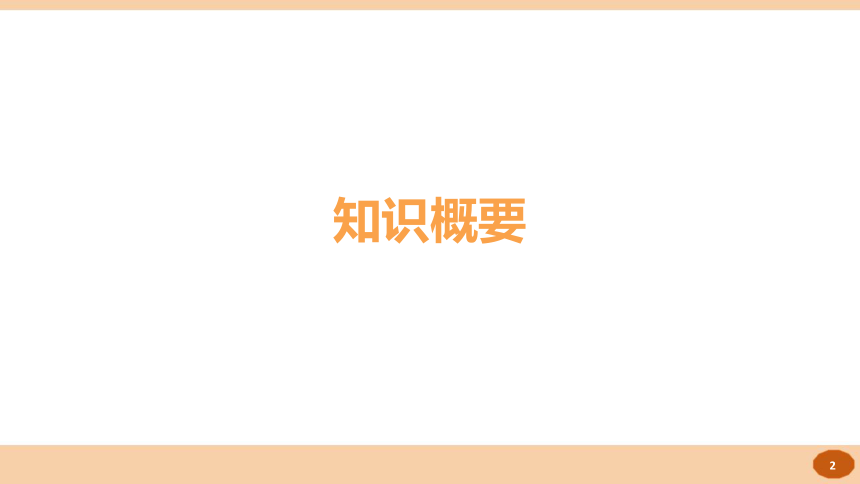
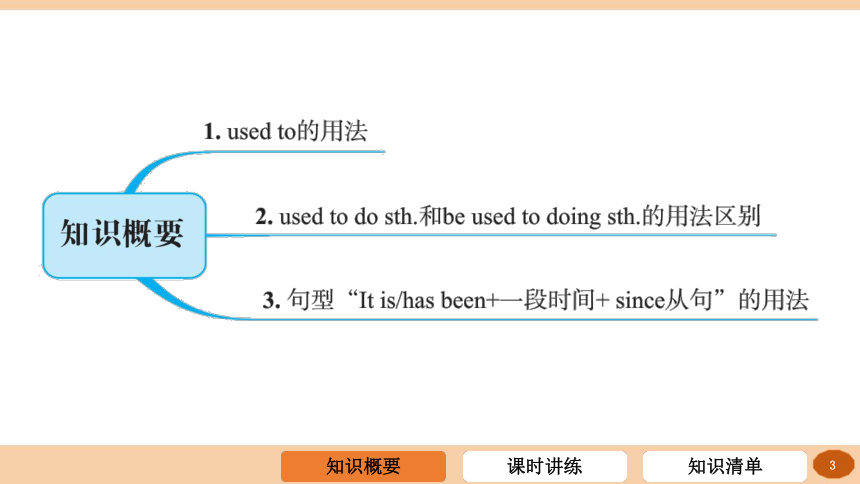
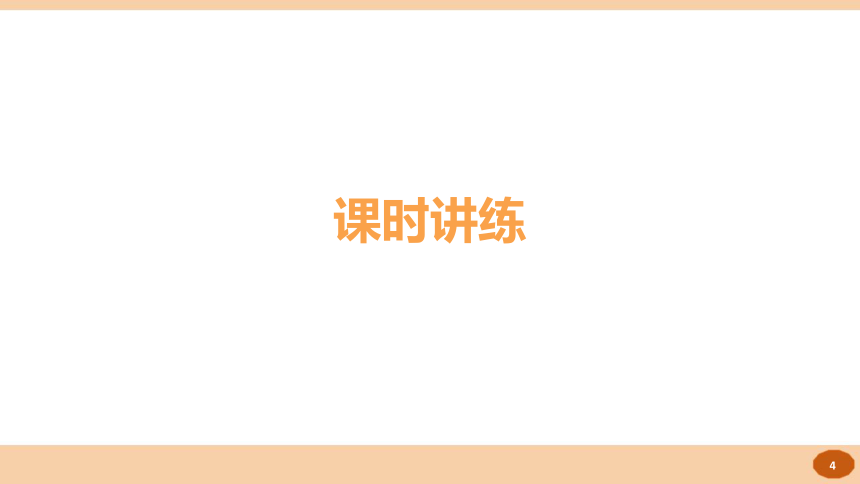
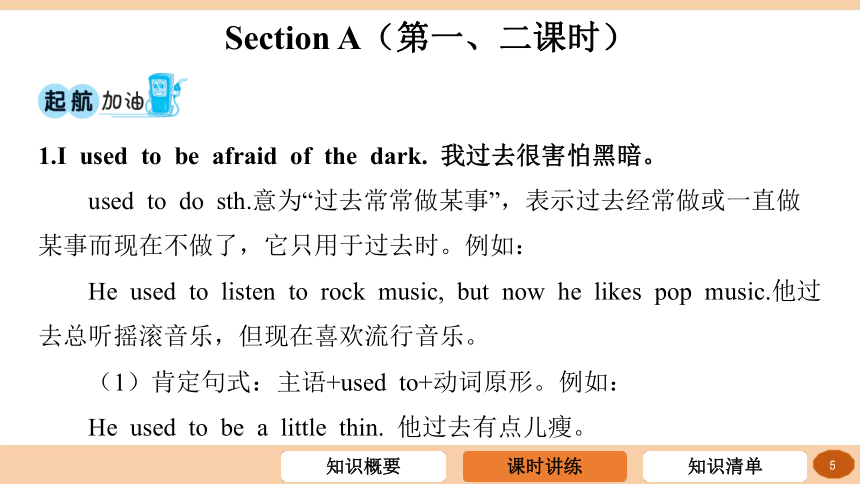
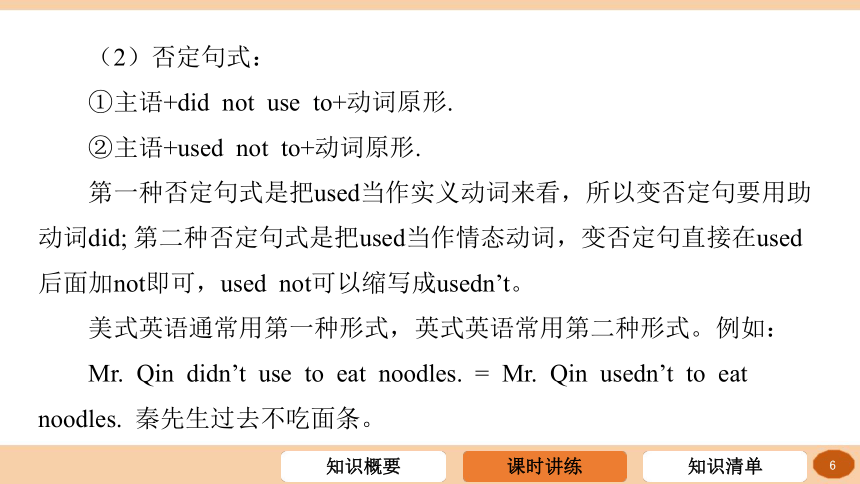
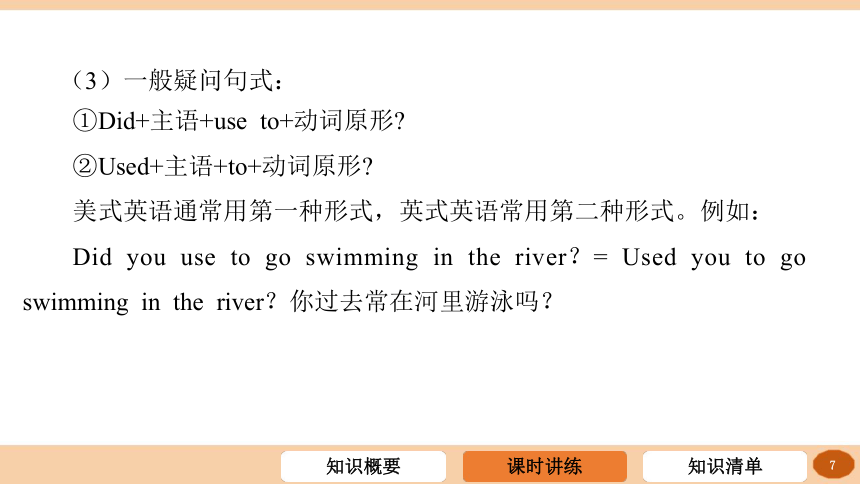
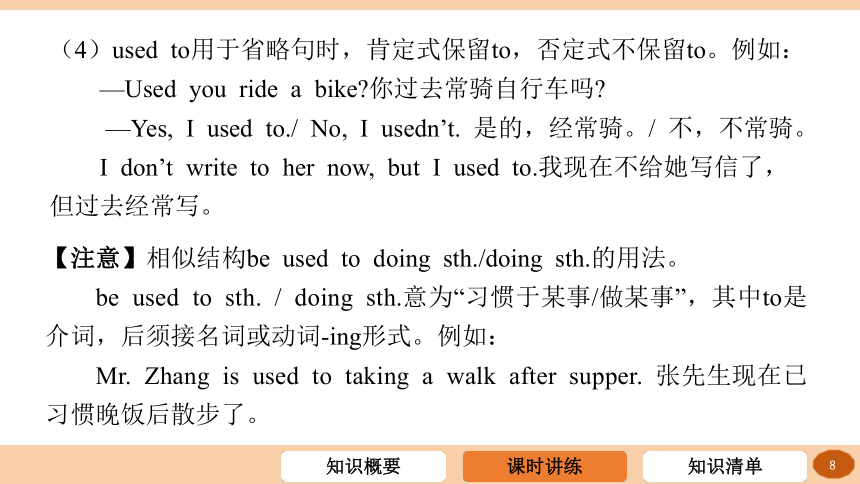
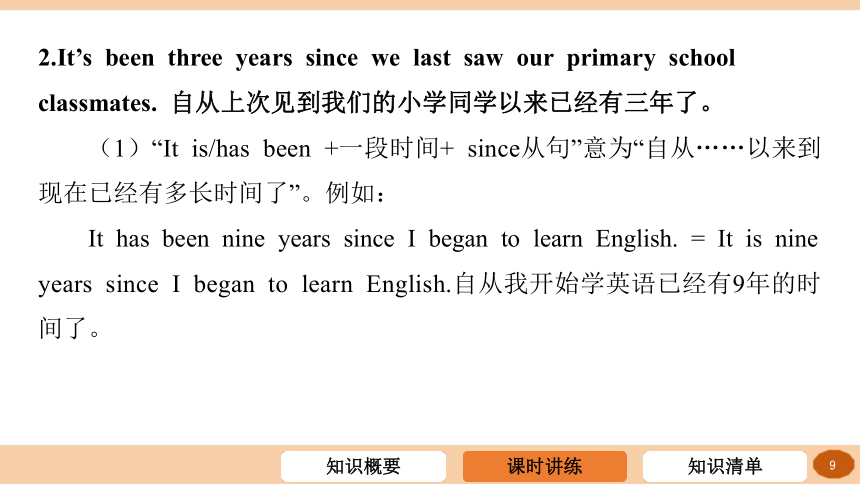
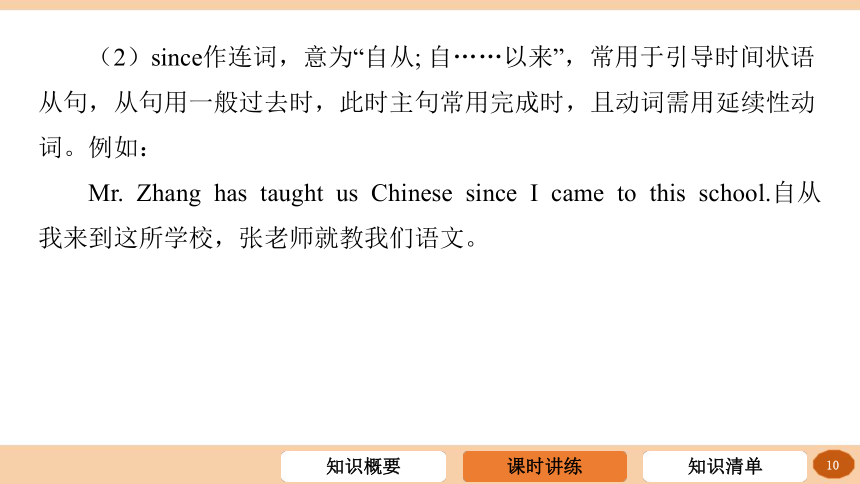
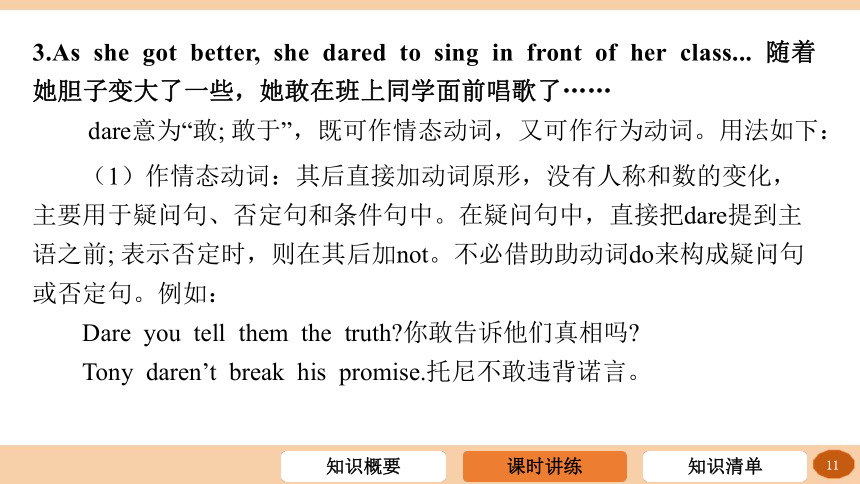
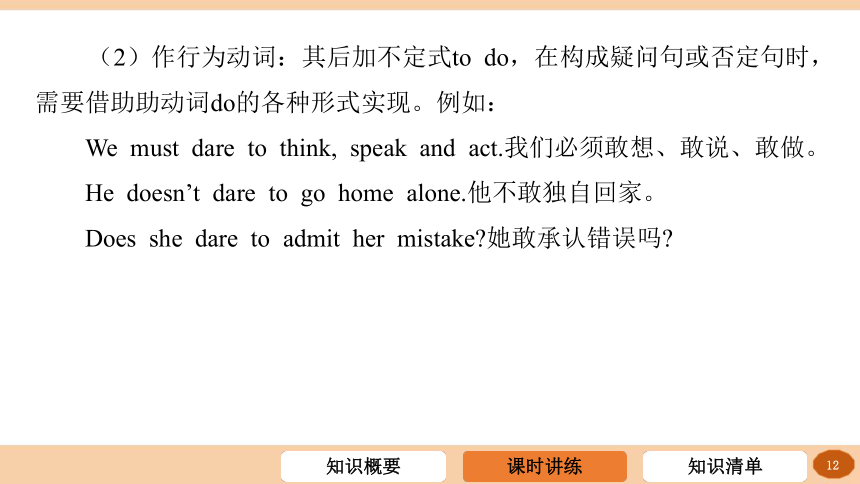
文档简介
(共63张PPT)
Unit 4 I used to be afraid of the dark.
知识概要
课时讲练
1.I used to be afraid of the dark. 我过去很害怕黑暗。
used to do sth.意为“过去常常做某事”,表示过去经常做或一直做某事而现在不做了,它只用于过去时。例如:
He used to listen to rock music, but now he likes pop music.他过去总听摇滚音乐,但现在喜欢流行音乐。
(1)肯定句式:主语+used to+动词原形。例如:
He used to be a little thin. 他过去有点儿瘦。
Section A(第一、二课时)
(2)否定句式:
①主语+did not use to+动词原形.
②主语+used not to+动词原形.
第一种否定句式是把used当作实义动词来看,所以变否定句要用助动词did; 第二种否定句式是把used当作情态动词,变否定句直接在used后面加not即可,used not可以缩写成usedn’t。
美式英语通常用第一种形式,英式英语常用第二种形式。例如:
Mr. Qin didn’t use to eat noodles. = Mr. Qin usedn’t to eat noodles. 秦先生过去不吃面条。
(3)一般疑问句式:
①Did+主语+use to+动词原形
②Used+主语+to+动词原形
美式英语通常用第一种形式,英式英语常用第二种形式。例如:
Did you use to go swimming in the river?= Used you to go swimming in the river?你过去常在河里游泳吗?
(4)used to用于省略句时,肯定式保留to,否定式不保留to。例如:
—Used you ride a bike 你过去常骑自行车吗
—Yes, I used to./ No, I usedn’t. 是的,经常骑。/ 不,不常骑。
I don’t write to her now, but I used to.我现在不给她写信了,但过去经常写。
【注意】相似结构be used to doing sth./doing sth.的用法。
be used to sth. / doing sth.意为“习惯于某事/做某事”,其中to是介词,后须接名词或动词-ing形式。例如:
Mr. Zhang is used to taking a walk after supper. 张先生现在已习惯晚饭后散步了。
2.It’s been three years since we last saw our primary school classmates. 自从上次见到我们的小学同学以来已经有三年了。
(1)“It is/has been +一段时间+ since从句”意为“自从……以来到现在已经有多长时间了”。例如:
It has been nine years since I began to learn English. = It is nine years since I began to learn English.自从我开始学英语已经有9年的时间了。
(2)since作连词,意为“自从; 自……以来”,常用于引导时间状语从句,从句用一般过去时,此时主句常用完成时,且动词需用延续性动词。例如:
Mr. Zhang has taught us Chinese since I came to this school.自从我来到这所学校,张老师就教我们语文。
3.As she got better, she dared to sing in front of her class... 随着她胆子变大了一些,她敢在班上同学面前唱歌了……
dare意为“敢; 敢于”,既可作情态动词,又可作行为动词。用法如下:
(1)作情态动词:其后直接加动词原形,没有人称和数的变化,主要用于疑问句、否定句和条件句中。在疑问句中,直接把dare提到主语之前; 表示否定时,则在其后加not。不必借助助动词do来构成疑问句或否定句。例如:
Dare you tell them the truth 你敢告诉他们真相吗
Tony daren’t break his promise.托尼不敢违背诺言。
(2)作行为动词:其后加不定式to do,在构成疑问句或否定句时,需要借助助动词do的各种形式实现。例如:
We must dare to think, speak and act.我们必须敢想、敢说、敢做。
He doesn’t dare to go home alone.他不敢独自回家。
Does she dare to admit her mistake 她敢承认错误吗
4.Only a very small number of people make it to the top. 只有很少一部分人能做到顶尖。
句中a small number of意为“少量的”。
【辨析】a number of与the number of的用法区别。
①a number of 意为“许多; 大量”,后面跟可数名词的复数形式,作主语时谓语动词要用复数形式。
②the number of意为“……的数目”,后面也跟可数名词的复数形式,但是作主语时,谓语动词要用单数形式。
例如:
A number of people do morning exercise in the park every morning. 许多人早晨在公园里晨练。
The number of the students in our school is over 4,000. 我们学校的学生人数是4 000多。
基础达标
一、根据汉语提示,写出正确的单词完成句子。
1.It’s impolite to speak loudly in _______(公开的).
public
2.Becky is very shy. She doesn’t _____(敢) to make a speech in
front of her classmates.
dare
3.Excuse me, I’m a reporter from CCTV. Could I have an _________
(采访) to you
interview
4.He was quite __________ (幽默的) and I liked that about him.
humorous
5.Don’t keep ______ (沉默的). Please tell what you’re thinking.
silent
6.There are several _______ (私人的) hospitals in our city.
private
二、用所给单词的正确形式填空。
1.I wonder whether it is _______ (help) with you.
helpful
2.Most _______ (Asia) are yellow people.
Asians
3.Is Russia a _________ (Europe) country?
European
4.As we know, Newton is a _______ (Britain).
British
5.There is going to be a _______ (speak) about protecting the
environment in our school this evening.
speech
三、单项选择。
1.Good news! We beat them by the ________ 3∶0 in the final
volleyball match.( )
C
A.time B.reason C.score
2.To our surprise, a ________ boy named Wang Hengyi can remember
so many poems.( )
A
A.five-year-old B.five-years-old C.five year old
&1& 由“数词+名词+形容词”构成的复合形容词中,名词要用单数形式。
3.The meeting room is ________ to hold 200 people.( )
A
A.big enough B.enough big C.small enough
4.Mr. Li has taught in this school ________ he was twenty years
old.( )
C
A.until B.for C.since
5.—How does Jack usually go to work
—He ________ drive a car, but now he ________ there to lose
weight.( )
B
A.used to; is used to walk
B.used to; is used to walking
C.was used to; is used to walk
6.Though she is ________ at home, she doesn’t feel ________ for she
has many things to do.( )
C
A.lonely; alone B.alone; alone C.alone; lonely
6.Though she is ________ at home, she doesn’t feel ________ for she
has many things to do.( )
C
A.lonely; alone B.alone; alone C.alone; lonely
&2& alone意为“独自一人的”; lonely意为“孤单的,寂寞的”。
7.—Many students don’t know how to ________ stress and become
worried.
—They’d better talk to their teachers or parents.( )
B
A.come up with B.deal with C.argue with
8.I’m so good at oral English that I dare ________ the English
speaking competitions and even talk to foreigners.( )
A
A.to take part in B.taking part in C.to join
9.—How did you improve your spoken English
—I often talked with friends in English and listened to English songs
________. ( )
C
A.by accident B.from now on C.from time to time
10.When the students see their teacher ________ into the classroom,
they stopped ________ at once.( )
C
A.to walk; telling B.entering; to speak C.walking; talking
能力训练
四、从方框中选择恰当的选项,补全对话。有一项多余。
A: Hi, Li Mei! I haven’t seen you for many years. 1.(. . . ). .
B: Oh, I have been to Hangzhou and lived with my parents.
B
A. Yes, I did.
B. Where have you been
C. You used to have short hair.
D. When have you gone
E. You have changed a lot, haven’t you
F. Now I’m very outgoing.
A: I’m very glad to see you again. 2.(. . . ). .
B: Yes, I have. I used to be quiet. 3.(. . .). .
A: That’s true. Did you use to play the piano
E
F
A. Yes, I did.
B. Where have you been
C. You used to have short hair.
D. When have you gone
E. You have changed a lot, haven’t you
F. Now I’m very outgoing.
B: 4.(. . . ). . But now I prefer sports. And I’m in a football team.
A: Wow! People always change.
B: You have changed a lot, too. 5.(. . .). .
A: Yeah. But now I prefer long hair.
B: I think you are more beautiful with long hair.
A: Thank you.
A
C
A. Yes, I did.
B. Where have you been
C. You used to have short hair.
D. When have you gone
E. You have changed a lot, haven’t you
F. Now I’m very outgoing.
Section B(第三、四课时)
1.We used to have to wear the school uniform to school. 我们过去不得不穿校服上学。
【辨析】wear, put on, dress, have on, be in的用法区别。
(1)wear 意为“穿,穿着,戴着”,强调状态。wear后面接可穿、戴的东西,包括眼镜、首饰等,可用于进行时。例如:
Linda is wearing a pair of glasses. 琳达戴着一副眼镜。
(2)put on 意为“穿上,戴上”,指“穿”的动作,反义词为take off。 例如:You should put on your coat. 你应该穿上外套。
(3)dress 意为“穿衣”,作及物动词,后接人作宾语,不能接表示衣服的名词,意为“给某人穿衣服”。例如:
The little boy is too young to dress himself. 这个小男孩年龄太小不能自己穿衣服。
(4)have on 指“穿”后的状态,后可接衣服、帽子、鞋子等能穿、戴的东西,但它不能用于进行时。例如:
He has on a white shirt today.今天他穿一件白色衬衣。
(5)be in表示状态,后接表示衣服的名词,也可接表示颜色的单词。例如:
The boy in blue is my brother. 穿蓝衣服的那个男孩是我弟弟。
2.When he was a little boy, he seldom caused any problems... 当他还是小男孩的时候,他很少惹麻烦……
seldom意为“不常; 很少”,作副词,通常放在实义动词之前,be动词、助动词、情态动词之后。例如:
As far as I know, he is seldom absent.据我所知,他很少会缺席。
【注意】seldom虽表示不完全否定,但由于其含有否定意义,故含有seldom的句子相当于否定句; 在反意疑问句中,疑问部分要用肯定形式。例如:
She seldom goes to bed before ten o’clock, does she 她很少在十点钟前上床睡觉,是吗?
3.They take pride in everything good that I do.他们为我每次优秀的表现感到自豪。
pride为名词,意为“骄傲,自豪”,其形容词形式为proud,意为“骄傲的; 自豪的”, take pride in = be proud of,意为“以……为骄傲; 引以为豪”。例如:
I’m proud of my motherland. 我为祖国自豪。
We really take pride in Chinese Women’s Volleyball Team.我们真地为中国女排感到自豪。
4.It’s very important to be there for their children. 父母陪伴在孩子身边是很重要的。
(1)句子中的it是形式主语,真正的主语是后边的动词不定式to be there for their children。
(2)be there for sb.意为“帮助某人,支持某人,安慰某人,和某人站在一起”,尤指在困难时提供帮助或支持等。例如:
No matter what happened in the past, I want her to know I am there for her.无论过去发生过什么,我想让她知道我始终支持她。
Best friends are always there for each other in times of trouble. 好朋友总是在对方最困难的时刻不离不弃。
基础达标
一、根据汉语提示,写出正确的单词完成句子。
1.I _______(很少) stay up late because I want to be healthy.
seldom
2.I’m feeling sad because I ______(不及格,失败) the math exam
again.
failed
3.Don’t let me _________ (影响) your decision.
influence
4.Were you _______ (缺席) Mary’s birthday party yesterday
absent
5.I want to know more _______ (确切地)about how to use this
word.
exactly
二、用所给单词的正确形式填空。
1.The mother is ______ (pride)of her son.
proud
2.Mr. Green gave us a short ___________ (introduce) about his plan.
introduction
3.In ________ (general), a graduate from a well-known university is
more likely to find a good job.
general
4.The mother feels ______ (pride) of his son.
proud
5.Nothing is __________ (possible) if you put your heart into it.
impossible
三、单项选择。
1.The boy is old enough to ________ himself.( )
B
A.wear B.dress C.put on
2.Was Jane absent ________ the class today ( )
C
A.of B.with C.from
3.—Do you like watching movies on your mobile phone
—No, I ________ do that because it makes me uncomfortable.( )
B
A.ever B.seldom C.always
4.—Chinese astronauts have walked in space several times so far.
—Yes, we ________ them.( )
C
A.take care of B.get on with C.take pride in
5.If you want to know the truth about it, you’d better ask him
________.( )
A
A.in person B.by accident C.in silence
6.My grandma ________ a lot in the last two years. She used to
watch TV, but now she enjoys ________ on the mobile phone.( )
B
A.changes; to chat B.has changed; chatting C.changed; chatting
7.Betty used to get up early, ________ she ( )
B
A.isn’t B.didn’t C.doesn’t
8.Jane is becoming ________ interested in collecting stamps, and now
she enjoys reading.( )
B
A.more B.less C.even
9.It ________ six years since she taught English in the junior high
school.( )
C
A.are B.was C.has been
9.It ________ six years since she taught English in the junior high
school.( )
C
A.are B.was C.has been
&3& 由句中since可知,主句应用现在完成时。
10.Sally used to ________ at night, but now she is used to ________
in the morning.( )
A.reading; read B.read; read C.read; reading
C
能力训练
四、从方框中选择适当的单词,并用其正确形式填空。
tired at work even child person one lonely
end or
There was once a little boy who told tales (搬弄是非) about
almost everything. Whenever anyone asked who had done this, 1. .
who had said that, he always jumped up and shouted out the
2. . name.
or
person’s
As the result, at his school the children 3. . up never
speaking to each other. They were 4. . of the little boy using their
words to tell stories. Because they no longer spoke, the 5. .
started to lose their voices, until no one could say anything 6. . all.
This made things very boring for the little boy. He felt 7. ..
ended
tired
children
at
lonely
tired at work even child person one lonely
end or
Wondering what he could do to solve the problem,the boy thought
that he could become the 8. . who would ask questions and leave
them unanswered. This plan 9. ., and now there were so many
questions need answers, everyone’s voices started working again.
10. . better, people became friendlier to him for having cured
(治愈) them.
one
worked
Even
tired at work even child person one lonely
end or
Self Check(第五课时)
本单元以“我们所发生的变化”为话题,谈论了人或事物的变化,通过今昔对比,让学生学会珍惜现在美好的生活,要求能够熟练地掌握并运用used to句型与be used to doing句型表达过去与现在的情况。
1.教材中出现的相关句型:
(1)I used to be afraid of the dark. 我过去常常害怕黑暗。
(2)It’s been three years since we last saw our primary school classmates.自从上次见到我们的小学同学以来已经有三年了。
(3)You used to be really short, didn’t you 你过去真的很矮,是吗?
(4)Emily didn’t use to eat a lot of vegetables, but now she loves carrots and tomatoes.埃米莉过去不怎么吃蔬菜,但是现在她喜欢吃胡萝卜和西红柿了。
(5)My life has changed a lot in the last few years. I used to...Now I’m...在过去的几年里,我的生活改变了许多。以前我常常……现在我……
(6)The biggest change in my life was...我生活中最大的改变是……
2.拓展的常用句型:
(1) This is the most important change because...这是最重要的变化,因为……
(2) It seems that...似乎……
(3) In the past, I... But now...过去,我……, 但是现在……
能力训练
一、从方框中选择恰当的选项,补全对话。有一项多余。
A: Hello! 1.(. . .). .
B: I’m Cindy.
A: Oh, Cindy! I’m Nick. Do you remember me
E
A. He used to be my best friend.
B. And your teacher was happy about that.
C. You used to be fat and short.
D. But now he is humorous and outgoing.
E. May I know your name, please
F. And the teacher used to criticize(批评) me for that.
B: Oh, wow! I remember. How nice to see you! 2.(. . .). . But now
you’re thin and tall.
C
A: Yes, I did. And you used to have long hair at that time. But now
your hair is short.
B: Right. I also remember you used to be naughty and talk to others
in class.
A. He used to be my best friend.
B. And your teacher was happy about that.
C. You used to be fat and short.
D. But now he is humorous and outgoing.
E. May I know your name, please
F. And the teacher used to criticize(批评) me for that.
A: 3.(. .). . But you were a good student. And you used to be good
at many subjects.
B: Look!Who’s that over there
A: He’s Harry. 4.(. .). .
B: Did he use to be serious
A: Yes. 5.(. . .). .
F
A
D
A. He used to be my best friend.
B. And your teacher was happy about that.
C. You used to be fat and short.
D. But now he is humorous and outgoing.
E. May I know your name, please
F. And the teacher used to criticize
(批评) me for that.
素养提升
二、完形填空。
I have two good friends. They are Jim and Alice. We are in the same class. We often. .1. . time together. They have changed a lot in the last few years.
Jim used to like junk food very much. He didn’t use to like fruit or . .2. .. He didn’t use to drink milk. He used to eat a lot of fast food, such as hamburgers, fried food and burnt meat. He used to be very fat
and . .3. .. When we climbed the mountains, he couldn’t . .4. . the top. But now he likes to eat much healthier food. He doesn’t eat junk food any more. For breakfast, he eats eggs and drinks milk. For lunch, he eats vegetables and chicken. And for dinner, he eats noodles, vegetables and some fruit. He . .5. .eats ice cream. He also takes more exercise now. Every morning, he . .6. . early and runs on the playground. In the afternoon, he plays soccer with our friends. Now he is much thinner and healthier than before.
Alice used to like most subjects,but she didn’t use to like math. She thought math was too . .7. .. She couldn’t learn it well. She used to be afraid . .8. . the math test. She couldn’t pass it. But now she doesn’t mind the math test. With the help of our math teacher, she has become more and more . .9. . in math. Last week, she got an A in the math test. How happy she was! You see, if you work as hard as you can, . .10. . is impossible.
1.( ) A.pay B.spend C.take
B
2.( ) A.cola B.hamburgers C.vegetables
C
3.( ) A.healthy B.unhealthy C.happy
B
4.( ) A.arrive B.get C.reach
C
5.( ) A.often B.usually C.hardly
C
6.( ) A.gets up B.gets off C.gets to
A
7.( ) A.easy B.interesting C.difficult
C
8.( ) A.of B.to C.with
A
9.( ) A.similar B.interested C.famous
B
10.( ) A.nothing B.something C.everything
A
三、阅读理解。
_________________________ Elisabeth Question:
Did you use to be shy If so, how did you
overcome (克服) it and how long did it take I need
your help.
_______________________________ Lucy Answer 1:
I was very shy when I was in high school. Over
the last 5 years or so, I have worked very hard at
overcoming it. I started by making conversations with
“friends’ friends” that I didn’t really know. It did take
me a lot of effort. Now I can talk to almost everyone.
__________________________ Tina Answer 2:
Yes, I used to be shy about two years ago. It took
me about two years to overcome my shyness. Don’t
worry. You’ll overcome your fears. Please find your
confidence.
________________ Anna Answer 3:
I used to be shy in high school until I started
serving at a restaurant. I found that really helpful. I have
become more outgoing. Because I had to talk to
strangers many times a day.
续表
根据材料内容,选择正确答案。
( ) 1.What can we learn about Elisabeth
A
A.She wanted to overcome her shyness.
B.She liked to help others to solve problems.
C.She wanted to write something about shyness.
( ) 2.How long did it take Lucy to overcome her shyness
C
A.About a year. B.Less than three years. C.About five years.
( ) 3.What does Tina think is important to overcome shyness
C
A.Kindness. B.Happiness. C.Confidence.
( ) 4.What helped Anna a lot to become more outgoing
A
A.Working as a waitress.
B.Eating at restaurants often.
C.Working all day and night.
( ) 5.What do Lucy, Tina and Anna have in common
B
A.They were all high school students.
B.They all used to be shy and overcame it successfully.
C.They all thought it was easy to overcome shyness.
四、书面表达。
Sheila是第六中学的学生,她以前学习不努力,学习成绩总是不太好。在好朋友Cathy的帮助下,她的学习有了明显的进步。请根据下面表格所给的提示写一篇短文,描述Sheila的改变及Cathy给予她的帮助。80词左右。
Sheila 过去 经常上学迟到,不认真听课,不按时完成家庭作业
现在 在Cathy的帮助下认真学习……
Cathy 和她谈心; 帮助她复习功课、解决问题
______________________________________________________________
__________________________________________________________________________________________________________________________________________________________________________________________________________________________________________________________________________________________________________________________________________________________________________________________________________________________________________________
______________________________________________________________
Sheila is a student at No. 6 Middle School. She didn’t do well in her subjects. She was always late for school. What was worse, she didn’t use to listen to the teachers carefully in class and she never finished her homework on time. Her teachers and parents were worried about her. Her good friend, Cathy, decided to do something to help her. She talked with Sheila and helped Sheila with her lessons and problems. Now Sheila works hard every day. She has made great progress with the help of Cathy.
One possible version:
知识清单
Unit 4
重点短语
1.______________过去常常做某事
used to do sth.
2.________________反复
from time to time
3._______________取得好成绩
get good grades
4._________拿起; 开始; 从事
take up
5.___________解决; 处理
deal with
6.__________敢于做某事
dare to do
7._______________出名
become famous
8.___________一直
all the time
9.___________________得到很多的关注
get tons of attention
10._________闲逛
hang out
11.________放弃
give up
12.___________正常生活
normal life
13.___________继续战斗; 继续斗争
fight on
14.___________关心
take care of
15.____________即使
even though
16.____________为……感到自豪
take pride of
17.______________为……自豪; 感到骄傲
be proud of
18._________________决定; 下决心
make a decision
19.______________缺席……
be absent from
重点句型
1.__________________________我过去很害怕黑暗。
I used to be afraid of the dark.
2.________________________他过去常常戴眼镜吗?
Did he use to wear glasses
3.__________________________________________我过去常常看到他天天在图书馆看书。
I used to see him reading in the library every day.
4.________________________________她敢在全班同学面前唱歌了。
She dared to sing in front of her class.
5.______________________________________________
只有很少一部分人能做到顶尖。
Only a very small number of people make it to the top.
6._______________________________我过去在学校不受欢迎。
I didn’t use to be popular in school.
So his parents took a 24-hour train and a 5-hour bus ride to get to Li Wen’s school.
7._______________________________________________________________________
因此李文的父母坐了24个小时的火车和5个小时的汽车到他的学校。
8._____________________________________
他们为我每次优秀的表现感到自豪。
They take pride in everything good that I do.
9._________________________________________
父母陪伴在孩子身边是很重要的。
It’s very important to be there for their children.
语法要点
1.used to的用法。
2.used to do sth.和be used to doing sth.的用法区别。
3.句型 “It is/has been+ 一段时间+ since从句” 的用法。
Unit 4 I used to be afraid of the dark.
知识概要
课时讲练
1.I used to be afraid of the dark. 我过去很害怕黑暗。
used to do sth.意为“过去常常做某事”,表示过去经常做或一直做某事而现在不做了,它只用于过去时。例如:
He used to listen to rock music, but now he likes pop music.他过去总听摇滚音乐,但现在喜欢流行音乐。
(1)肯定句式:主语+used to+动词原形。例如:
He used to be a little thin. 他过去有点儿瘦。
Section A(第一、二课时)
(2)否定句式:
①主语+did not use to+动词原形.
②主语+used not to+动词原形.
第一种否定句式是把used当作实义动词来看,所以变否定句要用助动词did; 第二种否定句式是把used当作情态动词,变否定句直接在used后面加not即可,used not可以缩写成usedn’t。
美式英语通常用第一种形式,英式英语常用第二种形式。例如:
Mr. Qin didn’t use to eat noodles. = Mr. Qin usedn’t to eat noodles. 秦先生过去不吃面条。
(3)一般疑问句式:
①Did+主语+use to+动词原形
②Used+主语+to+动词原形
美式英语通常用第一种形式,英式英语常用第二种形式。例如:
Did you use to go swimming in the river?= Used you to go swimming in the river?你过去常在河里游泳吗?
(4)used to用于省略句时,肯定式保留to,否定式不保留to。例如:
—Used you ride a bike 你过去常骑自行车吗
—Yes, I used to./ No, I usedn’t. 是的,经常骑。/ 不,不常骑。
I don’t write to her now, but I used to.我现在不给她写信了,但过去经常写。
【注意】相似结构be used to doing sth./doing sth.的用法。
be used to sth. / doing sth.意为“习惯于某事/做某事”,其中to是介词,后须接名词或动词-ing形式。例如:
Mr. Zhang is used to taking a walk after supper. 张先生现在已习惯晚饭后散步了。
2.It’s been three years since we last saw our primary school classmates. 自从上次见到我们的小学同学以来已经有三年了。
(1)“It is/has been +一段时间+ since从句”意为“自从……以来到现在已经有多长时间了”。例如:
It has been nine years since I began to learn English. = It is nine years since I began to learn English.自从我开始学英语已经有9年的时间了。
(2)since作连词,意为“自从; 自……以来”,常用于引导时间状语从句,从句用一般过去时,此时主句常用完成时,且动词需用延续性动词。例如:
Mr. Zhang has taught us Chinese since I came to this school.自从我来到这所学校,张老师就教我们语文。
3.As she got better, she dared to sing in front of her class... 随着她胆子变大了一些,她敢在班上同学面前唱歌了……
dare意为“敢; 敢于”,既可作情态动词,又可作行为动词。用法如下:
(1)作情态动词:其后直接加动词原形,没有人称和数的变化,主要用于疑问句、否定句和条件句中。在疑问句中,直接把dare提到主语之前; 表示否定时,则在其后加not。不必借助助动词do来构成疑问句或否定句。例如:
Dare you tell them the truth 你敢告诉他们真相吗
Tony daren’t break his promise.托尼不敢违背诺言。
(2)作行为动词:其后加不定式to do,在构成疑问句或否定句时,需要借助助动词do的各种形式实现。例如:
We must dare to think, speak and act.我们必须敢想、敢说、敢做。
He doesn’t dare to go home alone.他不敢独自回家。
Does she dare to admit her mistake 她敢承认错误吗
4.Only a very small number of people make it to the top. 只有很少一部分人能做到顶尖。
句中a small number of意为“少量的”。
【辨析】a number of与the number of的用法区别。
①a number of 意为“许多; 大量”,后面跟可数名词的复数形式,作主语时谓语动词要用复数形式。
②the number of意为“……的数目”,后面也跟可数名词的复数形式,但是作主语时,谓语动词要用单数形式。
例如:
A number of people do morning exercise in the park every morning. 许多人早晨在公园里晨练。
The number of the students in our school is over 4,000. 我们学校的学生人数是4 000多。
基础达标
一、根据汉语提示,写出正确的单词完成句子。
1.It’s impolite to speak loudly in _______(公开的).
public
2.Becky is very shy. She doesn’t _____(敢) to make a speech in
front of her classmates.
dare
3.Excuse me, I’m a reporter from CCTV. Could I have an _________
(采访) to you
interview
4.He was quite __________ (幽默的) and I liked that about him.
humorous
5.Don’t keep ______ (沉默的). Please tell what you’re thinking.
silent
6.There are several _______ (私人的) hospitals in our city.
private
二、用所给单词的正确形式填空。
1.I wonder whether it is _______ (help) with you.
helpful
2.Most _______ (Asia) are yellow people.
Asians
3.Is Russia a _________ (Europe) country?
European
4.As we know, Newton is a _______ (Britain).
British
5.There is going to be a _______ (speak) about protecting the
environment in our school this evening.
speech
三、单项选择。
1.Good news! We beat them by the ________ 3∶0 in the final
volleyball match.( )
C
A.time B.reason C.score
2.To our surprise, a ________ boy named Wang Hengyi can remember
so many poems.( )
A
A.five-year-old B.five-years-old C.five year old
&1& 由“数词+名词+形容词”构成的复合形容词中,名词要用单数形式。
3.The meeting room is ________ to hold 200 people.( )
A
A.big enough B.enough big C.small enough
4.Mr. Li has taught in this school ________ he was twenty years
old.( )
C
A.until B.for C.since
5.—How does Jack usually go to work
—He ________ drive a car, but now he ________ there to lose
weight.( )
B
A.used to; is used to walk
B.used to; is used to walking
C.was used to; is used to walk
6.Though she is ________ at home, she doesn’t feel ________ for she
has many things to do.( )
C
A.lonely; alone B.alone; alone C.alone; lonely
6.Though she is ________ at home, she doesn’t feel ________ for she
has many things to do.( )
C
A.lonely; alone B.alone; alone C.alone; lonely
&2& alone意为“独自一人的”; lonely意为“孤单的,寂寞的”。
7.—Many students don’t know how to ________ stress and become
worried.
—They’d better talk to their teachers or parents.( )
B
A.come up with B.deal with C.argue with
8.I’m so good at oral English that I dare ________ the English
speaking competitions and even talk to foreigners.( )
A
A.to take part in B.taking part in C.to join
9.—How did you improve your spoken English
—I often talked with friends in English and listened to English songs
________. ( )
C
A.by accident B.from now on C.from time to time
10.When the students see their teacher ________ into the classroom,
they stopped ________ at once.( )
C
A.to walk; telling B.entering; to speak C.walking; talking
能力训练
四、从方框中选择恰当的选项,补全对话。有一项多余。
A: Hi, Li Mei! I haven’t seen you for many years. 1.(. . . ). .
B: Oh, I have been to Hangzhou and lived with my parents.
B
A. Yes, I did.
B. Where have you been
C. You used to have short hair.
D. When have you gone
E. You have changed a lot, haven’t you
F. Now I’m very outgoing.
A: I’m very glad to see you again. 2.(. . . ). .
B: Yes, I have. I used to be quiet. 3.(. . .). .
A: That’s true. Did you use to play the piano
E
F
A. Yes, I did.
B. Where have you been
C. You used to have short hair.
D. When have you gone
E. You have changed a lot, haven’t you
F. Now I’m very outgoing.
B: 4.(. . . ). . But now I prefer sports. And I’m in a football team.
A: Wow! People always change.
B: You have changed a lot, too. 5.(. . .). .
A: Yeah. But now I prefer long hair.
B: I think you are more beautiful with long hair.
A: Thank you.
A
C
A. Yes, I did.
B. Where have you been
C. You used to have short hair.
D. When have you gone
E. You have changed a lot, haven’t you
F. Now I’m very outgoing.
Section B(第三、四课时)
1.We used to have to wear the school uniform to school. 我们过去不得不穿校服上学。
【辨析】wear, put on, dress, have on, be in的用法区别。
(1)wear 意为“穿,穿着,戴着”,强调状态。wear后面接可穿、戴的东西,包括眼镜、首饰等,可用于进行时。例如:
Linda is wearing a pair of glasses. 琳达戴着一副眼镜。
(2)put on 意为“穿上,戴上”,指“穿”的动作,反义词为take off。 例如:You should put on your coat. 你应该穿上外套。
(3)dress 意为“穿衣”,作及物动词,后接人作宾语,不能接表示衣服的名词,意为“给某人穿衣服”。例如:
The little boy is too young to dress himself. 这个小男孩年龄太小不能自己穿衣服。
(4)have on 指“穿”后的状态,后可接衣服、帽子、鞋子等能穿、戴的东西,但它不能用于进行时。例如:
He has on a white shirt today.今天他穿一件白色衬衣。
(5)be in表示状态,后接表示衣服的名词,也可接表示颜色的单词。例如:
The boy in blue is my brother. 穿蓝衣服的那个男孩是我弟弟。
2.When he was a little boy, he seldom caused any problems... 当他还是小男孩的时候,他很少惹麻烦……
seldom意为“不常; 很少”,作副词,通常放在实义动词之前,be动词、助动词、情态动词之后。例如:
As far as I know, he is seldom absent.据我所知,他很少会缺席。
【注意】seldom虽表示不完全否定,但由于其含有否定意义,故含有seldom的句子相当于否定句; 在反意疑问句中,疑问部分要用肯定形式。例如:
She seldom goes to bed before ten o’clock, does she 她很少在十点钟前上床睡觉,是吗?
3.They take pride in everything good that I do.他们为我每次优秀的表现感到自豪。
pride为名词,意为“骄傲,自豪”,其形容词形式为proud,意为“骄傲的; 自豪的”, take pride in = be proud of,意为“以……为骄傲; 引以为豪”。例如:
I’m proud of my motherland. 我为祖国自豪。
We really take pride in Chinese Women’s Volleyball Team.我们真地为中国女排感到自豪。
4.It’s very important to be there for their children. 父母陪伴在孩子身边是很重要的。
(1)句子中的it是形式主语,真正的主语是后边的动词不定式to be there for their children。
(2)be there for sb.意为“帮助某人,支持某人,安慰某人,和某人站在一起”,尤指在困难时提供帮助或支持等。例如:
No matter what happened in the past, I want her to know I am there for her.无论过去发生过什么,我想让她知道我始终支持她。
Best friends are always there for each other in times of trouble. 好朋友总是在对方最困难的时刻不离不弃。
基础达标
一、根据汉语提示,写出正确的单词完成句子。
1.I _______(很少) stay up late because I want to be healthy.
seldom
2.I’m feeling sad because I ______(不及格,失败) the math exam
again.
failed
3.Don’t let me _________ (影响) your decision.
influence
4.Were you _______ (缺席) Mary’s birthday party yesterday
absent
5.I want to know more _______ (确切地)about how to use this
word.
exactly
二、用所给单词的正确形式填空。
1.The mother is ______ (pride)of her son.
proud
2.Mr. Green gave us a short ___________ (introduce) about his plan.
introduction
3.In ________ (general), a graduate from a well-known university is
more likely to find a good job.
general
4.The mother feels ______ (pride) of his son.
proud
5.Nothing is __________ (possible) if you put your heart into it.
impossible
三、单项选择。
1.The boy is old enough to ________ himself.( )
B
A.wear B.dress C.put on
2.Was Jane absent ________ the class today ( )
C
A.of B.with C.from
3.—Do you like watching movies on your mobile phone
—No, I ________ do that because it makes me uncomfortable.( )
B
A.ever B.seldom C.always
4.—Chinese astronauts have walked in space several times so far.
—Yes, we ________ them.( )
C
A.take care of B.get on with C.take pride in
5.If you want to know the truth about it, you’d better ask him
________.( )
A
A.in person B.by accident C.in silence
6.My grandma ________ a lot in the last two years. She used to
watch TV, but now she enjoys ________ on the mobile phone.( )
B
A.changes; to chat B.has changed; chatting C.changed; chatting
7.Betty used to get up early, ________ she ( )
B
A.isn’t B.didn’t C.doesn’t
8.Jane is becoming ________ interested in collecting stamps, and now
she enjoys reading.( )
B
A.more B.less C.even
9.It ________ six years since she taught English in the junior high
school.( )
C
A.are B.was C.has been
9.It ________ six years since she taught English in the junior high
school.( )
C
A.are B.was C.has been
&3& 由句中since可知,主句应用现在完成时。
10.Sally used to ________ at night, but now she is used to ________
in the morning.( )
A.reading; read B.read; read C.read; reading
C
能力训练
四、从方框中选择适当的单词,并用其正确形式填空。
tired at work even child person one lonely
end or
There was once a little boy who told tales (搬弄是非) about
almost everything. Whenever anyone asked who had done this, 1. .
who had said that, he always jumped up and shouted out the
2. . name.
or
person’s
As the result, at his school the children 3. . up never
speaking to each other. They were 4. . of the little boy using their
words to tell stories. Because they no longer spoke, the 5. .
started to lose their voices, until no one could say anything 6. . all.
This made things very boring for the little boy. He felt 7. ..
ended
tired
children
at
lonely
tired at work even child person one lonely
end or
Wondering what he could do to solve the problem,the boy thought
that he could become the 8. . who would ask questions and leave
them unanswered. This plan 9. ., and now there were so many
questions need answers, everyone’s voices started working again.
10. . better, people became friendlier to him for having cured
(治愈) them.
one
worked
Even
tired at work even child person one lonely
end or
Self Check(第五课时)
本单元以“我们所发生的变化”为话题,谈论了人或事物的变化,通过今昔对比,让学生学会珍惜现在美好的生活,要求能够熟练地掌握并运用used to句型与be used to doing句型表达过去与现在的情况。
1.教材中出现的相关句型:
(1)I used to be afraid of the dark. 我过去常常害怕黑暗。
(2)It’s been three years since we last saw our primary school classmates.自从上次见到我们的小学同学以来已经有三年了。
(3)You used to be really short, didn’t you 你过去真的很矮,是吗?
(4)Emily didn’t use to eat a lot of vegetables, but now she loves carrots and tomatoes.埃米莉过去不怎么吃蔬菜,但是现在她喜欢吃胡萝卜和西红柿了。
(5)My life has changed a lot in the last few years. I used to...Now I’m...在过去的几年里,我的生活改变了许多。以前我常常……现在我……
(6)The biggest change in my life was...我生活中最大的改变是……
2.拓展的常用句型:
(1) This is the most important change because...这是最重要的变化,因为……
(2) It seems that...似乎……
(3) In the past, I... But now...过去,我……, 但是现在……
能力训练
一、从方框中选择恰当的选项,补全对话。有一项多余。
A: Hello! 1.(. . .). .
B: I’m Cindy.
A: Oh, Cindy! I’m Nick. Do you remember me
E
A. He used to be my best friend.
B. And your teacher was happy about that.
C. You used to be fat and short.
D. But now he is humorous and outgoing.
E. May I know your name, please
F. And the teacher used to criticize(批评) me for that.
B: Oh, wow! I remember. How nice to see you! 2.(. . .). . But now
you’re thin and tall.
C
A: Yes, I did. And you used to have long hair at that time. But now
your hair is short.
B: Right. I also remember you used to be naughty and talk to others
in class.
A. He used to be my best friend.
B. And your teacher was happy about that.
C. You used to be fat and short.
D. But now he is humorous and outgoing.
E. May I know your name, please
F. And the teacher used to criticize(批评) me for that.
A: 3.(. .). . But you were a good student. And you used to be good
at many subjects.
B: Look!Who’s that over there
A: He’s Harry. 4.(. .). .
B: Did he use to be serious
A: Yes. 5.(. . .). .
F
A
D
A. He used to be my best friend.
B. And your teacher was happy about that.
C. You used to be fat and short.
D. But now he is humorous and outgoing.
E. May I know your name, please
F. And the teacher used to criticize
(批评) me for that.
素养提升
二、完形填空。
I have two good friends. They are Jim and Alice. We are in the same class. We often. .1. . time together. They have changed a lot in the last few years.
Jim used to like junk food very much. He didn’t use to like fruit or . .2. .. He didn’t use to drink milk. He used to eat a lot of fast food, such as hamburgers, fried food and burnt meat. He used to be very fat
and . .3. .. When we climbed the mountains, he couldn’t . .4. . the top. But now he likes to eat much healthier food. He doesn’t eat junk food any more. For breakfast, he eats eggs and drinks milk. For lunch, he eats vegetables and chicken. And for dinner, he eats noodles, vegetables and some fruit. He . .5. .eats ice cream. He also takes more exercise now. Every morning, he . .6. . early and runs on the playground. In the afternoon, he plays soccer with our friends. Now he is much thinner and healthier than before.
Alice used to like most subjects,but she didn’t use to like math. She thought math was too . .7. .. She couldn’t learn it well. She used to be afraid . .8. . the math test. She couldn’t pass it. But now she doesn’t mind the math test. With the help of our math teacher, she has become more and more . .9. . in math. Last week, she got an A in the math test. How happy she was! You see, if you work as hard as you can, . .10. . is impossible.
1.( ) A.pay B.spend C.take
B
2.( ) A.cola B.hamburgers C.vegetables
C
3.( ) A.healthy B.unhealthy C.happy
B
4.( ) A.arrive B.get C.reach
C
5.( ) A.often B.usually C.hardly
C
6.( ) A.gets up B.gets off C.gets to
A
7.( ) A.easy B.interesting C.difficult
C
8.( ) A.of B.to C.with
A
9.( ) A.similar B.interested C.famous
B
10.( ) A.nothing B.something C.everything
A
三、阅读理解。
_________________________ Elisabeth Question:
Did you use to be shy If so, how did you
overcome (克服) it and how long did it take I need
your help.
_______________________________ Lucy Answer 1:
I was very shy when I was in high school. Over
the last 5 years or so, I have worked very hard at
overcoming it. I started by making conversations with
“friends’ friends” that I didn’t really know. It did take
me a lot of effort. Now I can talk to almost everyone.
__________________________ Tina Answer 2:
Yes, I used to be shy about two years ago. It took
me about two years to overcome my shyness. Don’t
worry. You’ll overcome your fears. Please find your
confidence.
________________ Anna Answer 3:
I used to be shy in high school until I started
serving at a restaurant. I found that really helpful. I have
become more outgoing. Because I had to talk to
strangers many times a day.
续表
根据材料内容,选择正确答案。
( ) 1.What can we learn about Elisabeth
A
A.She wanted to overcome her shyness.
B.She liked to help others to solve problems.
C.She wanted to write something about shyness.
( ) 2.How long did it take Lucy to overcome her shyness
C
A.About a year. B.Less than three years. C.About five years.
( ) 3.What does Tina think is important to overcome shyness
C
A.Kindness. B.Happiness. C.Confidence.
( ) 4.What helped Anna a lot to become more outgoing
A
A.Working as a waitress.
B.Eating at restaurants often.
C.Working all day and night.
( ) 5.What do Lucy, Tina and Anna have in common
B
A.They were all high school students.
B.They all used to be shy and overcame it successfully.
C.They all thought it was easy to overcome shyness.
四、书面表达。
Sheila是第六中学的学生,她以前学习不努力,学习成绩总是不太好。在好朋友Cathy的帮助下,她的学习有了明显的进步。请根据下面表格所给的提示写一篇短文,描述Sheila的改变及Cathy给予她的帮助。80词左右。
Sheila 过去 经常上学迟到,不认真听课,不按时完成家庭作业
现在 在Cathy的帮助下认真学习……
Cathy 和她谈心; 帮助她复习功课、解决问题
______________________________________________________________
__________________________________________________________________________________________________________________________________________________________________________________________________________________________________________________________________________________________________________________________________________________________________________________________________________________________________________________
______________________________________________________________
Sheila is a student at No. 6 Middle School. She didn’t do well in her subjects. She was always late for school. What was worse, she didn’t use to listen to the teachers carefully in class and she never finished her homework on time. Her teachers and parents were worried about her. Her good friend, Cathy, decided to do something to help her. She talked with Sheila and helped Sheila with her lessons and problems. Now Sheila works hard every day. She has made great progress with the help of Cathy.
One possible version:
知识清单
Unit 4
重点短语
1.______________过去常常做某事
used to do sth.
2.________________反复
from time to time
3._______________取得好成绩
get good grades
4._________拿起; 开始; 从事
take up
5.___________解决; 处理
deal with
6.__________敢于做某事
dare to do
7._______________出名
become famous
8.___________一直
all the time
9.___________________得到很多的关注
get tons of attention
10._________闲逛
hang out
11.________放弃
give up
12.___________正常生活
normal life
13.___________继续战斗; 继续斗争
fight on
14.___________关心
take care of
15.____________即使
even though
16.____________为……感到自豪
take pride of
17.______________为……自豪; 感到骄傲
be proud of
18._________________决定; 下决心
make a decision
19.______________缺席……
be absent from
重点句型
1.__________________________我过去很害怕黑暗。
I used to be afraid of the dark.
2.________________________他过去常常戴眼镜吗?
Did he use to wear glasses
3.__________________________________________我过去常常看到他天天在图书馆看书。
I used to see him reading in the library every day.
4.________________________________她敢在全班同学面前唱歌了。
She dared to sing in front of her class.
5.______________________________________________
只有很少一部分人能做到顶尖。
Only a very small number of people make it to the top.
6._______________________________我过去在学校不受欢迎。
I didn’t use to be popular in school.
So his parents took a 24-hour train and a 5-hour bus ride to get to Li Wen’s school.
7._______________________________________________________________________
因此李文的父母坐了24个小时的火车和5个小时的汽车到他的学校。
8._____________________________________
他们为我每次优秀的表现感到自豪。
They take pride in everything good that I do.
9._________________________________________
父母陪伴在孩子身边是很重要的。
It’s very important to be there for their children.
语法要点
1.used to的用法。
2.used to do sth.和be used to doing sth.的用法区别。
3.句型 “It is/has been+ 一段时间+ since从句” 的用法。
同课章节目录
- Unit 1 How can we become good learners.
- Section A
- Section B
- Unit 2 I think that mooncakes are delicious!
- Section A
- Section B
- Unit 3 Could you please tell me where the restroom
- Section A
- Section B
- Unit 4 I used to be afraid of the dark.
- Section A
- Section B
- Unit 5 What are the shirts made of?
- Section A
- Section B
- Review of Units 1-5
- Unit 6 When was it invented?
- Section A
- Section B
- Unit 7 Teenagers should be allowed to choose their
- Section A
- Section B
- Unit 8 It must belong to Carla.
- Section A
- Section B
- Unit 9 I like music that I can dance to.
- Section A
- Section B
- Unit 10 You're supposed to shake hands.
- Section A
- Section B
- Review of Units 6-10
- Unit 11 Sad movies make me cry.
- Section A
- Section B
- Unit 12 Life is full of the unexpected
- Section A
- Section B
- Unit 13 We're trying to save the earth!
- Section A
- Section B
- Unit 14 I remember meeting all of you in Grade 7.
- Section A
- Section B
- Review of Units 11-14
